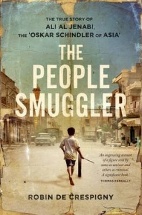The People Smuggler by Robin de Crespigny

Penguin, 2012. ISBN 9780670076550.
Recommended for senior readers. At the time of writing, Ali Al
Jenabi is living in Sydney on a Removal Pending Bridging Visa, which
allows him to live here until Iraq is deemed safe enough for his
return. The People smuggler is the story of his life up to this
point. He grew up in Iraq under Saddam Hussein; his father was
arrested and tortured in front of him as an Islamist; he and three
of his brothers were also tortured and spent years in gaol. In 2012
one brother was still imprisoned despite regime change in Iraq. Ali
became responsible for his family and earned money in a variety of
ways, including as a tailor. For a short time he was supported by a
dissident group in the Kurdish area of Iraq. He eventually escaped
into Iran and Turkey, and then Indonesia after hearing about asylum
in Australia. He found the situation for refugees to be unorganised,
and United Nations support to be non-existent. To earn money to help
his family escape he organised boats to carry groups of people to
Ashmore Reef. In return they paid him what they could and he used
that money to buy boats, pay for accommodation and bribe swathes of
officials, including immigration and police. He was a people
smuggler. Betrayed many times he was eventually arrested and tried
in Darwin. He served a gaol term and then was put in detention as an
asylum seeker. In his sentencing comments the judge at his trial
compared him with Oskar Schindler, the German manufacturer who saved
some Jews from the Holocaust, in that he acted for his family and
did not seek to make large sums of money. Some may disagree with
this. However, this is a story of almost unbearable suffering,
betrayal and determination. The use of the first person voice and
the present tense can be annoying, but ultimately the reader is left
feeling grateful that we live here but baffled and angry about our
attitudes to asylum seekers.
Jenny Hamilton